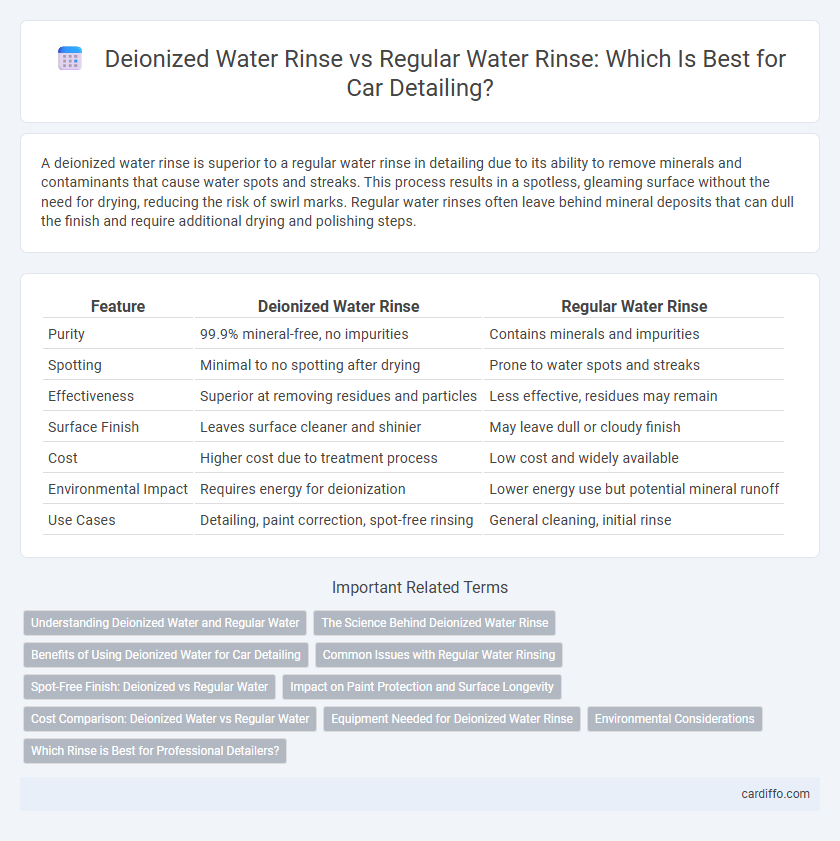A deionized water rinse is superior to a regular water rinse in detailing due to its ability to remove minerals and contaminants that cause water spots and streaks. This process results in a spotless, gleaming surface without the need for drying, reducing the risk of swirl marks. Regular water rinses often leave behind mineral deposits that can dull the finish and require additional drying and polishing steps.
Table of Comparison
| Feature | Deionized Water Rinse | Regular Water Rinse |
|---|---|---|
| Purity | 99.9% mineral-free, no impurities | Contains minerals and impurities |
| Spotting | Minimal to no spotting after drying | Prone to water spots and streaks |
| Effectiveness | Superior at removing residues and particles | Less effective, residues may remain |
| Surface Finish | Leaves surface cleaner and shinier | May leave dull or cloudy finish |
| Cost | Higher cost due to treatment process | Low cost and widely available |
| Environmental Impact | Requires energy for deionization | Lower energy use but potential mineral runoff |
| Use Cases | Detailing, paint correction, spot-free rinsing | General cleaning, initial rinse |
Understanding Deionized Water and Regular Water
Deionized water is purified by removing mineral ions such as calcium, magnesium, and sodium, resulting in water that is free from impurities and residue, ideal for a spotless and streak-free finish during detailing. Regular water contains dissolved minerals and impurities that can leave water spots and contaminants on surfaces after drying, potentially compromising the cleanliness of the vehicle. Understanding the chemical composition and purity levels of deionized versus regular water helps detailers choose the optimal rinse method for maintaining pristine automotive finishes.
The Science Behind Deionized Water Rinse
Deionized water rinse relies on a purification process that removes ions such as calcium, magnesium, and sodium, reducing mineral deposits and spots on surfaces during automotive detailing. This process uses ion exchange resins to replace charged particles with hydrogen and hydroxyl ions, resulting in ultra-pure water with a resistivity typically above 1 megohm-cm. The absence of dissolved solids in deionized water enhances its ability to bond with dirt particles and effectively lift contaminants without leaving residues, ensuring a pristine, spot-free finish compared to regular water rinsing.
Benefits of Using Deionized Water for Car Detailing
Deionized water rinse eliminates mineral deposits and water spots, ensuring a spotless and streak-free finish on car surfaces. It prevents contaminants that regular water may leave behind, enhancing the longevity of wax and sealant protection. Using deionized water reduces the need for vigorous drying, minimizing swirl marks and preserving the vehicle's paint integrity.
Common Issues with Regular Water Rinsing
Regular water rinsing often leaves behind mineral deposits and impurities that can cause water spots and streaks on vehicle surfaces. These residues promote faster oxidation and degrade paint quality, necessitating more frequent detailing. Using deionized water rinse eliminates these contaminants, ensuring a spotless finish and longer-lasting protection.
Spot-Free Finish: Deionized vs Regular Water
Deionized water rinse delivers a superior spot-free finish due to its lack of dissolved minerals and impurities, preventing water spots and streaks on surfaces. Regular water rinse often leaves behind mineral deposits, leading to visible spots and requiring extra drying or polishing. Using deionized water enhances the effectiveness of detailing by ensuring a pristine, residue-free finish on vehicles and glass surfaces.
Impact on Paint Protection and Surface Longevity
Deionized water rinse removes minerals and contaminants more effectively than regular water, significantly reducing water spots and residue on automotive paint surfaces. This purity helps maintain the integrity of paint protection coatings, extending their lifespan by preventing mineral buildup that can degrade protective layers. Regular water rinse may leave deposits that accelerate wear and reduce surface longevity, making deionized water the preferred choice for preserving paint quality.
Cost Comparison: Deionized Water vs Regular Water
Deionized water rinse involves higher upfront costs due to the need for specialized filtration systems, but it reduces the risk of mineral deposits and spotting on vehicles, potentially lowering long-term maintenance expenses. Regular water rinse is more cost-effective initially, relying on easily accessible tap water, but it can lead to water spots and residues that may require additional cleaning products or frequent detailing. When evaluating cost efficiency, consider that deionized water's purity minimizes surface damage, resulting in fewer corrective detailing treatments over time compared to regular water.
Equipment Needed for Deionized Water Rinse
Deionized water rinsing requires specialized equipment such as a deionizer unit or a reverse osmosis system combined with ion exchange resins to effectively remove minerals and contaminants from water. High-quality spray nozzles and pressure pumps are essential to ensure even distribution and thorough rinsing during the detailing process. Proper maintenance of the deionizing system is crucial to sustain water purity and prevent equipment damage or spotting on vehicle surfaces.
Environmental Considerations
Using deionized water for rinsing in detailing significantly reduces the presence of minerals and impurities, minimizing water spots and chemical residues that can harm the environment. Regular water rinse often contains contaminants that require additional cleaning agents, increasing chemical runoff and environmental impact. Choosing deionized water supports eco-friendly practices by reducing pollutant discharge and conserving water quality.
Which Rinse is Best for Professional Detailers?
Deionized water rinse is preferred by professional detailers due to its lack of minerals, which prevents water spots and streaks on vehicle surfaces. Regular water, containing minerals and impurities, often leaves residues that require additional wiping or polishing. Using deionized water ensures a cleaner, smoother finish, enhancing the overall detailing quality and efficiency.
Deionized Water Rinse vs Regular Water Rinse Infographic

 cardiffo.com
cardiffo.com